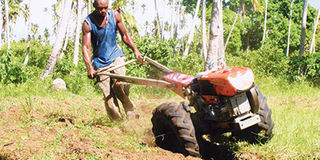Tanzania's fresh drive to unlock farming potential

Improving technology will help Tanzania exploit opportunities of agriculture, which is worth Sh30 trillion. File photo
What you need to know:
Kilimo Kwanza: The initiative which was launched in 2009 was formulated under the patronage of Tanzania National Business Council (TNBC) - a forum for public/private dialogue on strategic issues for the economic development of Tanzania.
Dar es Salaam. Tanzania’s effort to accelerate agriculture started as a major economic activity started since independence but the sector’s growth is still low.
The country has taken many initiatives which were largely implemented by the government the most recent ones differ with the past in the aspect of private sector participation.
From Siasa ni Kilimo (Politics is Agriculture), do-or-die agriculture philosophies of the late father of the nation Julius Kambarage Nyerere to Kilimo Kwanza (agriculture first) initiative, the sector has improved but the rate of growth has not reached that of other sectors like mining, construction and finance.
Earlier this week, President John Magufuli launched the second Agriculture Sector Development Programme which will cost $5.9 billion in ten years starting from 2017/18 to 2027/28.
This followed the first phase of the implementation of the same programme.
However, Tanzania has many other initiatives that support the agriculture development. Some analysts say the country has no problem with plans but a challenge of thorough implementation and consistence.
The following are some of the past and present initiatives and how they performed in transforming Tanzania’s agriculture which was estimated to be worth Sh30 trillion in 2016.
Kilimo Kwanza
The initiative which was launched in 2009 was formulated under the patronage of Tanzania National Business Council (TNBC) - a forum for public/private dialogue on strategic issues for the economic development of Tanzania.
It was guided by 10 pillars which aimed at instilling political will to transform agriculture; mobilize financial resources from the private sector; facilitate access to land for agriculture; and introduce and review incentive policies and regulations to attract and retain investments in agriculture.
The initiative also aimed at establishing industries to provide backward and forward linkages; promote the use of modern technologies by all producers and emphasize on institutional reorganization for good governance, better coordination, monitoring and evaluation.
Accelerated Food Security Programme (AFSP)
The programme was co-financed in 2009–2013 by the government of Tanzania and the World Bank to the tune of $245 million in parallel to ASDP.
The objective was to contribute to higher food production and productivity in targeted high potential areas in Tanzania through improving maize and rice farmers’ access to the critical agricultural inputs.
The Marketing Infrastructure, Value Addition and Rural Finance Support Programme (MIVARF)
This is co-financed by the International Fund for Agricultural Development [IFAD] and the African Development Bank (AfDB) for a total of $170 million, and coordinated by the Prime Minister’s Office.
The initiative is implemented in 26 regions of Tanzania, including the mainland (21 regions) and Zanzibar (5 regions) with a total of 141 rural districts.
The programme is expected to directly benefit close to 500,000 rural households.
The development objective is to enhance the incomes and food security of the target group sustainably through increased access to financial services and markets.
The Rural Micro, Small and Medium Enterprise Support Programme (MUVI)
A total of $25 million implemented through the Ministry of Industry Trade and Investment helps to improve rural employment opportunities in six regions (Iringa, Manyara, Mwanza, Pwani, Ruvuma and Tanga).
The programme provides selected medium and small-scale rural entrepreneurs with improved skills training, knowledge and access to markets, to help increase productivity, profitability and off-farm incomes.
Southern Agricultural Growth Corridor of Tanzania (SAGCOT)
The goal of this initiative is to expand investment in agribusiness leading to income growth among smallholders and employment generation across agribusiness value chains in the Southern Corridor.
Its mandate is to mobilise private sector investments and partnerships by catalysing large volumes of responsible private investment, targeted at rapid and sustainable agricultural growth, with major benefits for food security, poverty reduction and reduced vulnerability to climate change.
SAGCOT promotes ‘clusters’ of profitable agricultural farming and services businesses, with major benefits for smallholder farmers and local communities.
Big Results Now (BRN)
The slow pace of implementing Vision 2025 had prompted the government to embark on a new model dubbed ‘Big Results Now’. This initiative which was borrowed from Malaysia was implemented through six sectors namely agriculture, energy, education, resource mobilisation, transport and water.
Expert laboratories prepared priority implementation plans for the next two years. The objective of the agriculture BRN plan was to address critical sector constraints and challenges and to speed up agricultural GDP, improve smallholder incomes and ensure food security by 2015, mainly through smallholder aggregation models for main cereals and high potential crops contributing to import substitution, farm income and food security.
However, the special unit formed by former President Jakaya Kikwete in 2013 was disbanded last year by President John Magufuli.




